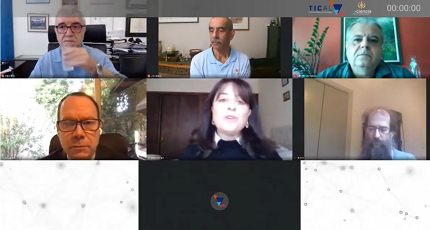The discussion on the importance of "artificial and natural" intelligences for the development of intelligent universities and the signing of the agreement for the creation of the Latin American Telemedicine University Network, RUTE-AL, were the highlights of the second day of activities of the TICAL2020 Conference and the 4th Latin American e-Science Meeting (Tuesday 1), which are taking place online from Monday, August 31, until next Thursday, September 3.
After a successful opening day, the programme of the events began again at 2pm GMT, with the "Artificial intelligence in support of the intelligent university" plenary session. The panel included the participation of Mateo Valero (Director of the Barcelona Supercomputing Center, Spain), Jim Ghadbane (CEO of the Canadian academic network, CANARIE), Bill Barth (Director of Future Technologies at the Texas Advanced Computing Center) and Guilherme Travassos (Head of the Computer and Systems Engineering Program - Coppe UFRJ). In a dynamic of questions and answers, and moderated by the CEO of RedCLARA, Luis Eliécer Cadenas, the speakers discussed the subject from different perspectives, such as HPC, Data and the work of the NRENs.
According to Guilherme Travassos, there are many good ideas in the AI area that can enhance the development of smart universities. However, the challenge is finding people capable of exploring the potential of these same ideas. "Artificial intelligence is key to the intelligent university, there is no doubt. But there is no 'silver bullet' either. Our impact will be proportional to our natural intelligence", Travassos explained. Other topics addressed during the conversation were the use of AI in the fight against the COVID-19 pandemic and the importance of collaboration between Europe and Latin America in research activities. "Europe needs Latin America", said Mateo Valero. The recording of the plenary session, which was entirely done in English, will be available on the RedCLARA channel on YouTube after the end of the Conference, with translation into Spanish and Portuguese*.
After the panel, representatives of the advanced networks of Mexico (Carlos Casasús), Colombia (Rafael Rodríguez Maldonado), Chile (Paola Arellano) and Ecuador (Juan Pablo Carvallo) joined Luis Eliécer Cadenas and Luiz Ary Messina (Director of the University Network of Telemedicine of Brazil - RUTE), in the signing of the agreement that officially creates the Rede Universitaria de Telemedicina de América Latina (RUTE-AL). The agreement was highly celebrated by everyone present. “One of the advantages of belonging to the Telemedicine University Network is the expansion of coverage networks, which undoubtedly provides more opportunities for the health system and for patients. Furthermore, RUTE-AL allows us to have a collaborative ecosystem: health professionals from universities and clinics will be able to share knowledge and experiences in the region”, explained Rodríguez Maldonado. All the information about the new network is already available on the RedCLARA website, at http://bit.ly/RUTE-AL.
The day continued with great attendance in the virtual stands, parallel sessions and workshops. The programme is available at https://tical2020.redclara.net and registration is still open and free of charge. Register and participate.
The TICAL2020 Conference and the 4th Latin American Meeting of e-Science are organized by RedCLARA and the BELLA Project, with the support of the national research and education networks of Latin America and the sponsorship of Google, Bedu.Tech, Amazon Web Services, CloudHesive Latam , Commscope, LACNIC, Internet Society and Cirrus Identity.
*All plenary and parallel sessions recordings will be soon published on our YouTube channel: RedCLARA-TV.





